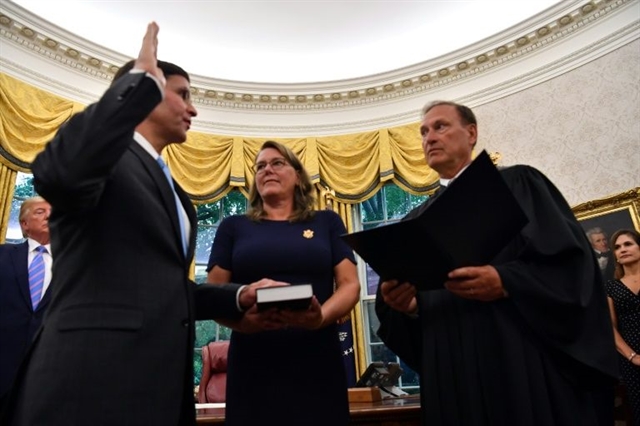 World
World


|
| Mark Esper (left) is sworn in as US secretary of defense by Supreme Court Justice Samuel Alito as President Donald Trump looks on in the Oval Office. — AFP Photo |
WASHINGTON — Former soldier Mark Esper was sworn in as US secretary of defense Tuesday after earning Senate confirmation, filling America's longest-ever Pentagon leadership vacuum as Washington faces mounting tensions with Iran and struggles to end the long-running Afghanistan war.
President Donald Trump's second Defense Department chief takes over nearly seven months after the shock departure of Jim Mattis, the deeply respected career US Marine who broke with Trump over policy on the Middle East and Afghanistan.
Two others were made acting defense secretary this year to fill the void -- including Patrick Shanahan, who served a six-month temporary stint but resigned for family reasons in June and withdrew from consideration for the full-time top post.
Esper sailed through the confirmation process at lightning speed. He earned broad bipartisan support and was confirmed by a vote of 90 to 8.
Later on Tuesday, he was sworn in at an Oval Office ceremony attended by several Senate Republicans and Trump, who called it "a very important day" for the nation.
"There is no one more qualified to lead the Department of Defense," the president said.
Esper's confirmation brings ballast to a Pentagon destabilized by the leadership revolving door since late December, and comes as the world's primary military power is engaged in conflicts in countries including Afghanistan and is being tested by Tehran.
Senate Majority Leader Mitch McConnell, the top Republican in Congress, hailed Esper, who served a two-year stint as secretary of the US Army beginning in 2017, as "a thoroughly well prepared nominee" who has the respect of the national security community and can hit the ground running.
"The world is full of serious threats to America, to our allies and to our interests, not least among them obviously is Iran's insistence on continuing to ratchet up tensions in the Middle East," McConnell said in a Senate floor speech on Monday.
"Having a Senate-confirmed secretary of defense, especially one of this quality, could not come a moment too soon."
Combat experience
Esper has significant Middle East experience. He fought in Iraq during the Gulf War in 1991, and was part of the US Army's famed 101st Airborne Division known as the "Screaming Eagles."
He is also close to Secretary of State Mike Pompeo, with whom he studied at the prestigious West Point Military Academy. Both men graduated in 1986.
On the political front, he served as an advisor to several lawmakers on Capitol Hill, including Republican senator Chuck Hagel, who later became secretary of defense under Democratic president Barack Obama.
But his links with the defense industry drew criticism during his confirmation process.
Democratic Senator Elizabeth Warren was among five 2020 presidential candidates who voted against Esper.
Warren highlighted his potential conflicts of interest due to his affiliation with defense contractor Raytheon, for whom he was a lobbyist when Trump tapped him for the army secretary post.
"At the age of 18, I went to West Point, and I swore an oath to defend this Constitution, and I embraced a motto called duty and honor and country," he told Warren during his confirmation hearing.
"And I've lived my life in accordance with those values ever since then," he said, adding: "I went to war for this country."
Number two Senate Democrat Dick Durbin suggested he voted for Esper as a way to help keep an impulsive president in check.
Esper "has a special responsibility to advise a President who has no experience in national security," Durbin tweeted. "I believe that Dr. Esper is up to the task."
Trump raised eyebrows recently with a series of imprudent comments.
Afghanistan's leaders sought clarification from the White House after Trump said on Monday could easily and swiftly win a war in which "Afghanistan would be wiped off the face of the Earth."
He also told reporters he was feeling less inclined to deal with Iran because "they behave very badly," and that Washington was "ready for the absolute worst" with the Islamic republic. — AFP




